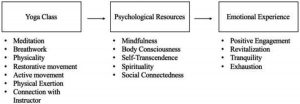Different Aspects of Yoga Practice Affect the Psychological Benefits
By John M. de Castro, Ph.D.
“Most styles of yoga are based on the same basic yoga poses (called asanas), however the experience of one style can be radically different than another.” – DoYoga
Yoga training has been shown to improve health and well-being. It has also been found to be effective for a large array of medical and psychiatric conditions, either stand-alone or in combination with more traditional therapies. But there are a wide variety of different yoga training techniques and practices. Although the benefits of yoga practices in general are well studied there is little scientific research comparing different components of yoga practices and the benefits.
In today’s Research News article “Exploring how different types of yoga change psychological resources and emotional well-being across a single session.” (See summary below or view the full text of the study at: https://www.ncbi.nlm.nih.gov/pmc/articles/PMC7081324/ ) Park and colleagues recruited adults who had attended at least 5 yoga classes. There were 3 different practice sites engaged in a variety of types of yoga; Hatha yoga: Ashtanga, Baptiste, Bikram, Forrest, Iyengar, Kripalu, Kundalini, Pranayama, Restorative, Vinyasa Flow, and Yin. Before and after a 60-minute yoga class they were measured for psychological resources (mindfulness, body awareness, self-transcendence, peacefulness and contentment, social connectedness), and exercise induced feelings (positive emotions, revitalization, tranquility, and exhaustion). After the class they were measured for properties of yoga, physical taxation, and therapist warmth.
In comparison to before the yoga class, afterward there were significant increases exercise induced feelings (positive emotions, revitalization, tranquility, and decreased exhaustion), psychological resources (mindfulness, body awareness, self-transcendence, spirituality, and social connectedness). In addition, the greater the increase in positive emotions, revitalization, and tranquility, the greater the increase in mindfulness, self-transcendence, spirituality, and social connectedness. In addition, the greater the decrease in exhaustion the greater the increase in mindfulness, self-transcendence, spirituality, and social connectedness.
They also investigated different aspects of the yoga practice and their relationships to psychological resources and emotions. They found that the higher the levels of the restorative aspects of the yoga practice the greater the changes in self-transcendence, spirituality, and tranquility, the higher the levels of the breathwork aspects of the yoga practice the greater the changes in body awareness and self-transcendence, and the higher the levels of the therapist warmth the greater the changes in self-transcendence and positive engagement.
These results are correlative and need to be interpreted with caution. But they provide interesting clues as to how yoga practice may produce some of its benefits. It increases the psychological resources available to the participants and improves their emotions. They also showed that the larger the increases in psychological resources produced by yoga practice the greater the improvements in emotions. Finally, they showed that restorative and breathwork aspects of yoga practice and the therapist warmth were most related to improvements.
Much more research is needed. But this study suggests that yoga practice strengthens the psychological resources of the practitioners and these are related to improved emotions. It also demonstrates that certain aspects of yoga practice that are differently emphasized in different styles of yoga, particularly restorative and breathwork aspects of yoga practice and the therapist warmth, may contribute to yoga’s benefits.
So, different aspects of yoga practice affect the psychological benefits.
“figure out your intention—do you want to do yoga to improve your health; lessen stress; increase mindfulness; gain strength; lose weight or relieve pain? Once you have the answer to this question you will know the practice that is right for you.” – Femina
CMCS – Center for Mindfulness and Contemplative Studies
This and other Contemplative Studies posts are also available on Google+ https://plus.google.com/106784388191201299496/posts and on Twitter @MindfulResearch
Study Summary
Park, C. L., Finkelstein-Fox, L., Groessl, E. J., Elwy, A. R., & Lee, S. Y. (2020). Exploring how different types of yoga change psychological resources and emotional well-being across a single session. Complementary therapies in medicine, 49, 102354. https://doi.org/10.1016/j.ctim.2020.102354
Abstract
Objectives:
Yoga demonstrates beneficial effects in many populations, yet our understanding of how yoga brings about these effects is quite limited. Among the proposed mechanisms of yoga are increasing psychological resources (mindfulness, body consciousness, self-transcendence, spiritual peace, and social connectedness) that may bring about salutary effects on emotional wellbeing. Further, yoga is a complex practice comprising meditation, active and restorative postures, and breathwork; however little is known about how different components may affect mechanisms. We aimed to determine how an acute session of yoga (and its specific components) related to pre- to post- session changes in proposed mechanisms (psychological resources) and whether those changes were associated with positive changes in emotions.
Design:
144 regular yoga practitioners completed measures of mindfulness, body consciousness, self-transcendence, social connectedness, spiritual peace, and exercise-induced emotions (positive engagement, revitalization, tranquility, exhaustion) immediately before and after a yoga session (N=11 sessions, each a different type of yoga). Perceived properties of each yoga session, exercise exertion and engagement with the yoga teacher were assessed immediately following the session.
Results:
Pre- to post- yoga, levels of positive emotions (engagement, tranquility and revitalization) increased while exhaustion decreased. Further, all psychological resources increased and closely tracked improved emotions. Additionally, aspects of the yoga session correlated with changes in psychological resources (mechanisms) and emotions.
Conclusions:
Yoga may influence multiple psychological mechanisms that influence emotional well-being. Further, different types of yoga may affect different mechanisms. Results can inform yoga interventions aiming to optimize effects through specific mechanisms such as mindfulness or spirituality.
Highlights
- To gain a better understanding of how yoga brings about beneficial effects, we examined changes in psychological resources and emotions across a single session of yoga.
- All five psychological resources (mindfulness, body consciousness, self-transcendence, spiritual peace, and social connectedness) increased from pre-to-post yoga session, and all emotions (positive engagement, revitalization, tranquility and exhaustion) improved.
- Further, improvements in emotions were associated with improvements in psychological resources.
- Different styles of yoga were associated with differential improvements in psychological resources and emotions.
https://www.ncbi.nlm.nih.gov/pmc/articles/PMC7081324/
